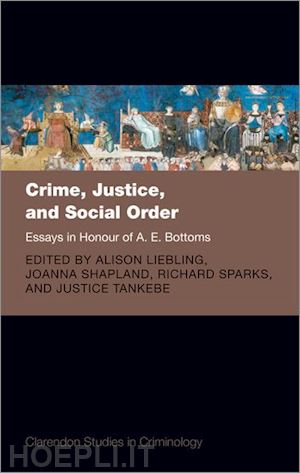Alison Liebling is Professor of Criminology and Criminal Justice at the University of Cambridge and the Director of the Institute of Criminology's Prisons Research Centre. She has researched prison suicide, conceptualizing and measuring the moral quality of prison life, the management of difficult prisoners, incentives and earned privileges, staff-prisoner relationships, values, practices and outcomes in public and private sector corrections, the changing nature of staff-prisoner and prisoner-prisoner relationships in high security prisons and the changing role of relationships, trust and forms of order in prison. She was awarded an ESRC-funded 'Transforming Social Science' grant in 2012-14 and was made a Fellow of the British Academy in 2018. Joanna Shapland is the Edward Bramley Professor of Criminal Justice at the University of Sheffield. She has previously worked at King's College London and Oxford University. She is Chair of the Restorative Justice Forum (Scotland) and Executive Editor of the International Review of Victimology. Awarded the Outstanding Achievement Award by the British Society of Criminology, she directed the national evaluation of restorative justice for the Ministry of Justice, as well as being a consultant expert to the Council of Europe and an independent assessor to the Review of Criminal Justice in Northern Ireland, following the Good Friday Agreement. Richard Sparks is Professor of Criminology at the University of Edinburgh. Amongst many long-standing connections, Richard's first research post was on a project directed by Anthony Bottoms on 'Control Problems and the Long-Term Prisoner', which amongst other things resulted in their book, with Will Hay, Prisons and the Problem of Order by Richard Sparks, Anthony Bottoms and Will Hay. Oxford: Clarendon Press, 1996. He has written and edited several other books including (with Ian Loader) Public Criminology? (Routledge, 2010). Richard is Convenor of Howard League Scotland. Justice Tankebe is a University Lecturer in Criminology and a Fellow at St. Edmund's College, University of Cambridge. Justice has held postdoctoral research fellowships from the ESRC, the British Academy, and Fitzwilliam College. Prior to his current appointment, he was a teaching associate on the Police Executive Programme at the Institute of Criminology, Cambridge. Justice's interests include legitimacy, distributive injustice, police violence, vigilantism, and corruption.











